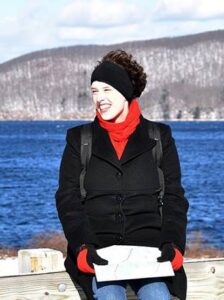If you have Sjögren’s syndrome, or know somebody who does, this is a must read.
I see an oral medicine doctor, Dr. Athena Papas, at Tufts University School of Dental Medicine in Boston. She has been an invaluable part of my medical team in treating and managing the oral complications I have from Sjögren’s syndrome, the most important of which has been removing salivary stones from my glands in a non-invasive manner. Since I started seeing her, I have not had one gland infection or permanent blockage.
A while back, she mentioned to me that she is heading up a study to test a potential new Sjögren’s medication. At my visit this week, she gave me the eighteen page document she gives to prospective new participants. I am not going to rewrite the entire document, but I am going to try and present to you the highlights of the document because my understanding is the investigating group is still looking for study volunteers. According to Dr. Papas, I do not qualify for the study, but I am publishing this in case any of you may qualify. I will provide the contact information at the end. And yes, I have permission to share this information.
This study is a multi-center, randomized, double-blind, placebo-controlled, parallel group study to assess the safety, tolerability, pharmacokinetics, and preliminary efficacy of a new biologic medication currently called CFZ533 in patients with primary Sjögren’s syndrome. The principal investigator is Athena Papas, DMD, PhD. Co-investigators are Britta E. Magnunson, DMD, Arwa M. Farag, BDS, DSSc, and Mabi L. Singh, BDS, MS, DMD. The study site is Tufts University School of Dental Medicine in Boston, Massachusetts. The project is being sponsored by Novartis Institutes for BioMedical Research.
The study is being conducted to test an experimental drug for primary Sjögren’s syndrome (pSS) with the current name of CFZ533. The goal of the study is to see if the medication is well tolerated and if it has a positive effect on Sjogren’s syndrome (SS). The study involves taking multiple doses given by intravenous infusion. Thirty subjects will be enrolled. The goal is for a total of forty-two subjects to complete the study across ALL study sites. There are twelve study centers planned in the United Kingdom, Hungary, Switzerland, and in the United States. More study centers may participate in the study later.
This is the first time CFZ533 will be tested in subjects with pSS, but it is not the first time that the drug has been given to humans. As of December 15, 2014, forty-eight healthy volunteers and six patients with rheumatoid arthritis have been given intravenous or subcutaneous injection of CFZ533 in the clinical trial. Overall, there have been no abnormal lab results and the drug was tolerated well.
The following is is a summary of the requirements to participate in this study:
* Must be between the ages of 18-75 with a confirmed diagnosis of PRIMARY Sjögren’s syndrome. Must weigh between 110-330 pounds.
* If you are on glucocorticoid treatment (i.e. steroids), the dose may not exceed 10 mg (or equivalent) per day and must be at a stable level for at least two weeks before starting the study and for the duration of the entire study.
* If on Plaquenil, the dose must be stable for at least four weeks before officially starting the study and for the duration of the study.
* If being treated with methotrexate, the dose may not exceed 25 mg per week for at least three months before officially starting the study and for the duration.
* Vaccines must be up-to-date.
* Cannot have a confirmed diagnosis of Seconday Sjögren’s syndrome.
* May not be using other investigational drugs or have a history of hypersensitivity to the study drug or to drugs with a similar chemical makeup. Cannot be on medications that are known to cause dry mouth and cannot be a person at risk for thromboembolic events.
* Cannot be pregnant or nursing
* Cannot have donated blood or had significant blood loss in the past eight weeks.
* Cannot participate if you have a pancreatic injury or pancreatitis, have the presence of a medically significant heart condition, have experienced a systemic infection within thirty days of starting the study, have a condition that puts you at a higher risk of infection or have a history of tuberculosis.
If you have received any of the following treatments, you cannot participate in the study:
* Cyclosphosphamide within six months.
* Corticosteroid bolus I.V. >1mg/kg within three months.
* Rituximab within twelve months.
* Belimumab within six months
* Any other biologic within one month or five times the half-life. A biologic is a medication that is created using human genes. They are designed to restrain certain parts of the immune system that cause inflammation. Half-life is the amount of time taken for the concentration of the biologic to decrease in the body by half.
* Any other immunosuppressive such as cyclosporine A or mycophenolate within three months.
Are you still with me here?? Whew, that’s a lot of information. I need a lunch break….
OK, I’m back. I took quite a bit of time to explain the study in order to give the reader a better idea if he/she qualifies for the study. I know a lot of this information is technical, so if you are unsure if you would qualify, definitely call the number at the end of this entry and speak to someone.
I am not going to be as detailed about the procedure of the study because it is quite extensive, but I will summarize what I think are the important points.
The study is comprised of fifteen visits. The study takes approximately nine week (thirty-six months) total. It is broken down into three study periods:
1. Placebo-controlled period. Four doses of either the experimental drug or a placebo will be administered in addition to the standard of care therapy for treating pSS. You will not know if you are receiving the actual drug or a placebo. A placebo is a substance that has no therapeutic effect. Placebos are used as a control component to test the effectiveness of the study drug and determine whether the delivery circumstance of the study drug has an effect as well.
2. Open-label period. All study subjects will receive four doses of the experimental drug.
3. Follow-up period. Subjects will be followed up without study drug.
Some other key points for the study:
* The first two visits are for screening and collecting baseline information.
* Your salivary flow and eye dryness will be measured (noninvasive). If you have not yet had a salivary gland biopsy, that will be required (invasive).
* Blood samples will be taken during the study.
* As with any study or medication, there are risks. Examples of this include allergic reaction, increased risk of infection, blood clotting, etc.
* Female participants who are sexually active, and are able to get pregnant, must follow strict guidelines regarding birth control. Details available before starting the study.
There are benefits to being a part of this study. You will receive medical care during the study. There is some scientific evidence showing that blocking CD40 by CFZ533 may have therapeutic efficacy in pSS, however the benefits of CFZ533 are not established and should not be considered fact. Information from this study may help you and/or other people with pSS in the future.
All subject records will use numbers and/or initials and be de-identified. Only study personnel will have access to the locked storage area where these files will be kept. All study personnel will be required to follow HIPAA guidelines.
There is no cost to participate in the study. You will not be charged for the study drug or any of the tests/procedures performed. Expenses, such as transportation, are your responsibility at all times. You will be paid for taking part in the study. This is to compensate the subject for their time. Each study visit has a $200 value assigned to it, so total compensation to complete all fifteen visits will be $3000. This is taxable income and you will be required to complete a W-9 form. Payments will be made after completion of each study visit.
If you are interested in learning more about this important study and/or would like to participate, please contact Elizabeth Tzavaras at (617) 636-3931. I would also encourage you to share this information/blog on any social media sites you are a member of, especially if you know other Sjögren’s patients. If you are a blogger, especially if you are a medical blogger, I would encourage you to do the same. We have no cure for Sjögren’s and as far as I am concerned, we don’t even have decent treatment options. In order to get reliable and viable treatment options, we need research. Research requires study volunteers, so please spread the word!


Just found your blog. I'm 33 and was diagnosed with SS in September last year. I'm terrified I'm going to die of any of the various complications of Sjogrens itself or from cancer caused by being on Methotrexate. On 25mg per week Methotrexate. I'm hoping a bunch of your readers are going to jump on and tell me they were diagnosed in their 30s and are now in their 70s-80s and still going strong and that I don't need to be afraid. I'm in Australia – doesn't look like it's part of this study.
Just to confirm – I don't have cancer – just scared I'm going to get it.
Looks like the only research center in the US is in Pennsylvania… If they had one in Nashville, I'd qualify and I'd do it.
Ugh, that stinks!!
Hi Liz! I'm sorry to hear about the diagnosis. I was also diagnosed in my 30's, so I would like the answer to the living until 70-80's as well!
I know there is risk with methotrexate but I personally have never known someone to get cancer from it and as a patient AND a nurse, I have seen a lot of people on it.
I have endured a lot of complications from Sjögren's and they are a very real thing, but for me, a lot of the fear is of the unknown. I would even say that fear is just about one of the hardest things to deal with in regards to this illness. You are definitely not alone though and if I can be of any help, please feel free to e-mail me at: cmolloy435@charter.net. Good luck!